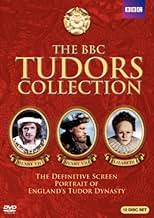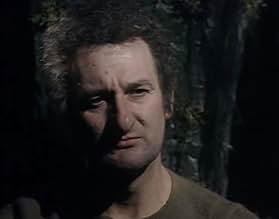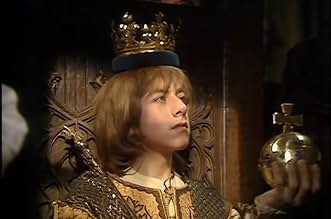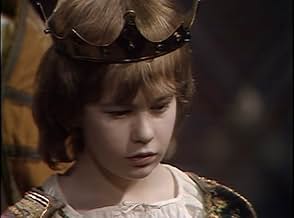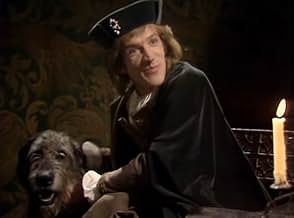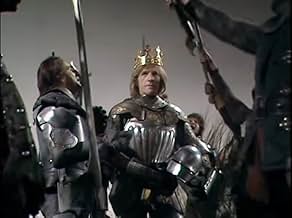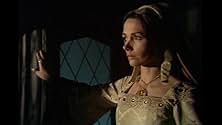A series recording the key events in the reign of Henry Tudor and his founding of the Tudor DynastyA series recording the key events in the reign of Henry Tudor and his founding of the Tudor DynastyA series recording the key events in the reign of Henry Tudor and his founding of the Tudor Dynasty
Browse episodes
Featured reviews
Victorious at Bosworth Fields, Henry VII assumes the crown of England but is forced to deal with pretenders, disloyalty, and insurrection while trying to rule as a benevolent and enlightened King. James Maxwell is quite good as Henry and the cast, made up of competent, albeit not noteworthy, British actor and actresses is fine. The stagy look of the film makes up for the obvious limited budget and the script has that pseudo-Shakespearian weightiness than makes for a good historical outing. The episodic series was made as a 'prequel' to the BBC's very popular 'The Six Wives of Henry VIII' and 'Elizabeth R', (both 1971) and the three productions seen in historical order would make for an entertaining and educational excursion through the sometimes benign, sometimes bloody, three generation Tudor dynasty.
Impossible to imagine being made now, The Shadow of the Tower is a deep and insightful look at the Tudor era's least remembered ruler and its founder: Henry VII.
The writing is always engaging even in the weaker episodes and there is a great eye for historical detail. Some episodes rise even higher than the rest, particulary those written by Hugh Whitemore.
I see many reviewers here accuse the show of bad acting. I cannot understand that. Some minor roles are of course, but then I can't imagine what these people would make of more recent shows like the Tudors. I am sure nobody thinks that of James Maxwell who is obviously the stand out in portraying a compassionate, fair ruler who is occasionally conflicted but is also highly intelligent.
Where it works in history it perhaps fails in drama. It is really a dramatised documentary though probably more accurate than most. I think a lot of people would find it dull. The history is what it is interested in, however, and there is not a wasted word as far as I am concerned. Henry's reign may not on the surface be especially dramatic compared to others but it was actually poised on a very interesting turning point in the shift from the Middle Ages to the Modern Age.
I would recommend to anyone interested in history and the episode "The Serpent and the Comforter" works great as a standalone.
I would recommend to anyone interested in history and the episode "The Serpent and the Comforter" works great as a standalone.
Henry Tudor was second only to his Granddaughter, Elizabeth I as a successful monarch. Unfortunately, his latter years were bitter and overshadowed by illness. Further, his son, the future Henry VIII lived in his shadow and did much to outdo and erase his father's legacy. He was also cast by wishful thinkers as the murderer of the Princes in the Tower because they want to re-invent the worthless Richard III. The problem for the BBC when they wanted to complete their coverage of the Tudors, following The Six Wives and Elizabeth R series, is that Henry VIIIth claimed many of his father's achievements as his own and did much to bury the personal history. Thus, the writers of this series had little material to flesh out Tudor's rise from obscurity to creation of a dynasty, defeating his enemies and becoming a millionaire. So, notwithstanding a good cast and, potentially, a much more exciting story, the project was dogged by wordy and worthy scripts making an under-performing prequel to the bloodier dramas. This story needs a remake! A valiant effort at portraying the least bloodthirsty of the Tudors, but somewhat bloodless!
In the early 1970's 'The Six Wives of Henry VIII' and 'Elizabeth R' enthralled the TV viewers of the UK with superb acting, gorgeous costumes, incisive scripts and high - for the time - production values. Even more exciting they were in colour, which was a real novelty at the time.
Looking for a follow-up project the BBC decided to go back in time to the founding of the Tudor line by Henry VII. The unfortunate truth is that Henry senior was far less colourful than his son or granddaughter. He was a shrewd ruler who used bureaucracy, the law and financial policy to maintain his power - and he was devotedly married to his wife Elizabeth and heart-broken when she died. In other words a bit of a cold fish with little fire and romance to turn into 12 hours of TV drama.
This story could have been told in half the time or less, but the BBC obviously thought they were on the crest of a wave and got too greedy. The result was a long-winded trudge through 24 years of history. Henry's reign was not uneventful, nor unsuccessful, but there were no wives or mistresses, no Spanish Armada and no rousing speeches.
The scripts are turgid and wordy and some of the acting positively amateurish. The younger women are also too much like 1960's 'dolly birds' as we called them then. If you enjoyed the other Tudor series of the time, don't think this is of the same quality. One to avoid.
Looking for a follow-up project the BBC decided to go back in time to the founding of the Tudor line by Henry VII. The unfortunate truth is that Henry senior was far less colourful than his son or granddaughter. He was a shrewd ruler who used bureaucracy, the law and financial policy to maintain his power - and he was devotedly married to his wife Elizabeth and heart-broken when she died. In other words a bit of a cold fish with little fire and romance to turn into 12 hours of TV drama.
This story could have been told in half the time or less, but the BBC obviously thought they were on the crest of a wave and got too greedy. The result was a long-winded trudge through 24 years of history. Henry's reign was not uneventful, nor unsuccessful, but there were no wives or mistresses, no Spanish Armada and no rousing speeches.
The scripts are turgid and wordy and some of the acting positively amateurish. The younger women are also too much like 1960's 'dolly birds' as we called them then. If you enjoyed the other Tudor series of the time, don't think this is of the same quality. One to avoid.
James Maxwell was probably far more accomplished as a theatre director than an actor, and his casting here as the first English Tudor monarch, King Henry VII, is probably the source of this drama's struggles. That king had a reputation for deviousness and ruthlessness that this performance seems to overly sanitise; indeed the whole thing lacks the potency and vibrancy of it's chronological successor "Henry VIII and his Six Wives" (1970). It is spread across 13 fifty minute episodes - some based on fact: his defeat of Richard III; accession; marriage to Edward IV's daughter - Elizabeth of York; Perkin Warbeck and his rebellions etc. and some based on potential scenarios that he may have faced during his reign - the best probably being an encounter with Peter Jeffrey as "The Prisoner", a man accused of heretical behaviour because he happens to believe that Jesus is not best represented to the people by a corrupt and venal Church. There is a decent cast drawn from English theatre circles with Norma West appearing, sparingly, as his wife, but the dialogue is overly verbose; the studio scenery implies some of the dinginess of their actual existence but at the same time leaves us looking at something over staged and really pretty unrealistic (and poorly lit) most of the time. The fact that many of the episodes were directed by different people also doesn't help the continuing, pretty tame, narrative of this fascinatingly shrewd individual from history. Maybe had it just condensed the reign into six episodes under the hand of one director then it would have improved significantly? Rarely available nowadays - probably far too expensive to repeat, but it is still very much worth watching despite it's flaws.
Did you know
- TriviaJames Maxwell (Henry VII) was the only actor to appear in all thirteen episodes of the series.
- ConnectionsRemake of Tower of London: The Innocent (1969)
- How many seasons does The Shadow of the Tower have?Powered by Alexa
Details
- Release date
- Country of origin
- Language
- Also known as
- Hendrik VII
- See more company credits at IMDbPro
- Runtime1 hour
- Color
Contribute to this page
Suggest an edit or add missing content

Top Gap
By what name was The Shadow of the Tower (1972) officially released in Canada in English?
Answer


